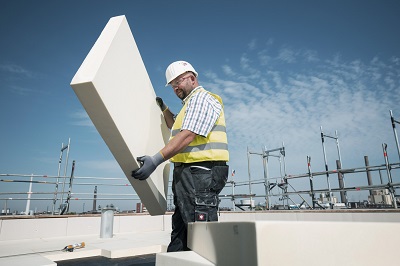At K 2022, Covestro will showcase the possibilities of particularly sustainable plastics for the world and tomorrow's growth markets. To this end, the company will soon be presenting new products and materials for many key areas that support the circular economy and climate neutrality at the world's largest plastics trade show. In this regard, Covestro sees itself as an industry pioneer and is focusing above all on future-oriented, creative partnerships. International media now got a foretaste of the trade show appearance in October at a press conference in Düsseldorf, Germany.
"Mankind is facing enormous challenges. In addition to acute crises, we need to overcome long-term challenges such as protecting the climate, nature and resources and thus safeguarding our livelihoods," said CEO Dr. Markus Steilemann. "This can be achieved if business and society consistently orient themselves towards the circular economy. Plastics are indispensable on this long journey, and Covestro is pleased to contribute particularly sustainable new products and materials to this end, tailored to the customer needs of today and tomorrow. Together with our partners, this is how we intend to seize the immense opportunities for sustainable growth."
"Crafting Connections With You"
Under the motto "Crafting Connections With You", Covestro intends to establish new collaborations with customers and partners and strengthen existing ties at booth A 75 in Hall 6 at K 2022 from October 19 to 26, as well as on a digital platform. "Collaboration along key value chains in particular is of great importance for the vision of a full circular economy to succeed," said Dr. Andrea Maier-Richter, Global Head of the TPU Business Entity. "With our more sustainable developments, we support our customers and partners in facilitating their transition to the circular economy and achieving their own climate goals."

To make circular solutions in the product portfolio even more recognizable to customers in the future, Covestro has developed the "CQ" concept. The brand suffix stands for "Circular Intelligence" and indicates the alternative raw material base for the company's products if it is at least 25 percent. Among the first "CQ" products is Desmodur®CQ. Polyurethane foams based on Desmodur®CQ are used, for example, in upholstered furniture, mattresses and thermal insulation.
Moving away from fossil resources
Covestro primarily uses mass-balanced, renewable precursors and plastic waste as alternative raw materials, as well as green electricity. To realize its vision of a circular economy and achieve its ambitious climate targets, the company is also focusing on the future supply of "green" hydrogen and the development of innovative recycling technologies.
All these measures help conserve fossil resources and avoid CO2emissions. In the long term, Covestro aims to offer all its products in a climate-neutral1 version. By 2030, the company plans to invest around one billion euros in circular economy projects. To achieve net zero emissions, Covestro also expects to invest between EUR 250 million and EUR 600 million by 2030.
The high-performance plastic polycarbonate and the important polyurethane (PU) raw material methylene diphenyl diisocyanate (MDI) are already available in larger quantities as climate-neutral products. Like the renewable PU raw material toluene diisocyanate (TDI), they are manufactured using renewable2 raw materials such as new biomass and biowaste and residual materials, which are allocated to the products by calculation using the mass balance approach. According to a common calculation model1, no net CO2 emissions are generated during production from the cradle to the factory gate.
For its own raw material supply, Covestro cooperates with a number of industrial partners who provide renewable precursors such as mass-balanced acetone, phenol and benzene. Suppliers such as Borealis, Total, Mitsui Chemicals and Mitsui & Co. produce these raw materials at sites certified to the internationally recognized ISCC PLUS standard. At the same time, Covestro is gradually converting its production sites to this standard, which is already the case in Leverkusen, Dormagen, Krefeld-Uerdingen, Antwerp and Shanghai.
Most recently, Covestro announced a collaboration with Neste and South Korean petrochemical company SK geo centric to supply mass-balanced benzene for its MDI production in China. MDI is an important raw material for rigid PU foam, which provides efficient insulation for buildings and the cold chain. Certified polycarbonate, in turn, plays a role in the automotive, electrical and electronics, and medical industries, among others. And TDI is a precursor for PU flexible foam, which is used to make mattresses and upholstered furniture. Covestro has also signed contracts with energy suppliers such as Ørsted, EnBW, ENGIE, Datang Wuzhong New Energy and others to supply sites in Germany, Belgium and China with electricity from renewable sources.
Innovative technologies for chemical recycling
Hermann-Josef Dörholt, Global Head of the Performance Materials segment, emphasized the great importance of recycling technologies in order to really close loops. As examples, Dörholt cites innovative processes for the chemical recycling of mattress foam waste and used rigid PU foam. Together with partners, Covestro has developed a process to chemically recover the two main components from PU mattress foam: the polyol and the precursor to the isocyanate TDI used. The results of the tests conducted to date are promising and are currently being tested in a pilot plant at the Leverkusen site. The project is now to be extended to the industrial processing of flexible foams.
Covestro is also coordinating the EU project CIRCULAR FOAM with 22 partners from nine countries, which is dedicated to the chemical reprocessing of rigid polyurethane foam from building insulation materials and used refrigeration equipment. The products make an important contribution to saving CO2 emissions and reduced energy consumption, but recycling processes and systematic waste management have been lacking until now. The project aims to save up to one million tons of waste and 2.9 million tons of CO2 emissions annually in Europe by 2040.
- For more reports on K 2022, click here.

 iConnectHub
iConnectHub
 Login/Register
Login/Register Supplier Login
Supplier Login


























